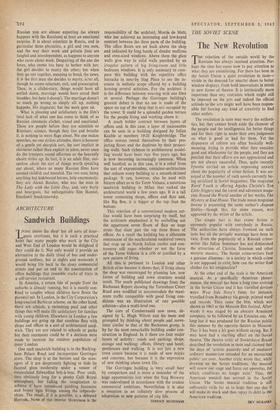THE SOVIET SCENE
The New Revolution
THE rejection of the outside world by the Russians has always received attention. Per- haps the time has come now to pay attention to what they are assimilating. For there has been in the Soviet Union a quiet revolution in taste— visible in the demand for smarter shoes to better window displays, froth bold innovations in music to new forms of theatre. It is intrinsically more important than any restraints which might still be imposed on the arts and indeed the official attitude to the arts might well have been respon- sible for forcing any kind of creativity to find other outlets.
The revolution in taste may worry the authori- ties, but they cannot brush aside the clamour of the people and the intelligentsia for better things and for their right to make their own judgments on what is good or bad for them. Yet the dispensers of culture are often basically well- meaning, trying to provide what they consider good and wholesome for the people, and they are puzzled that their efforts are not appreciated and are not always successful. Thus, quite recently Izvestia carried an article expressing anxiety about the popularity of crime fiction. It was an- noyed at the number of such novels currently be- ing serialised in Soviet magazines. The magazine Rural Youth is offering Agatha Christie's Ten Little Niggers and the travel and adventure maga- zine Round the World another of her works, The Mystery at End House. The trade union magazine Smena is presenting the same author's Augean Stables—though this, for some reason, was approved by the writer of the article.
The simple fact is that crime fiction is extremely popular with everybody in Russia. The authorities have always frowned on such taste but all the periodic warnings have been in vain. Even the popularity of a Russian crime- writer like Julian Semionov has not diminished the attraction• of Christie, Simenon and other western masters. The Soviet crime-writers face a genuine dilemma : in a society in which crime is not supposed to exist, how can the writer find clothes for his imagination?
At the other end of the scale is the American musical. As a specifically American pheno- menon, the musical has been a long time arriving in the Soviet Union and it has travelled devious ways. West Side Story's fame, for instance, travelled from Broadway via gossip, printed word and records. Then came the , filth, which was shown in 1963 at the MoscoW fllm festival. After- Wards it was staged by an obscure Armenian company, to be followed by an Estonian one. At long last it was produced for the Russian public this summer by the operetta theatre in Moscow. That it has been a hit goes without saying. But it may have had a startling effect on the Soviet theatre. The theatre critic of Sovietskaya Russia described the revolution in taste and claimed that the days of 'artistic passivity and of mediocre ordinary mannerism intended for an unexacting public' are over. Another critic wrote that, while drawing on the Soviet traditions, 'the musical will renew our stage and force out operettas, for which conditions no longer exist.' Thus, the American musical has arrived in the Soviet Union. The Soviet musical tradition is still sufficiently virile for us to hope that one day it will make its mark and thus repay its debt to the American tradition.
DEV MURARICA






























 Previous page
Previous page